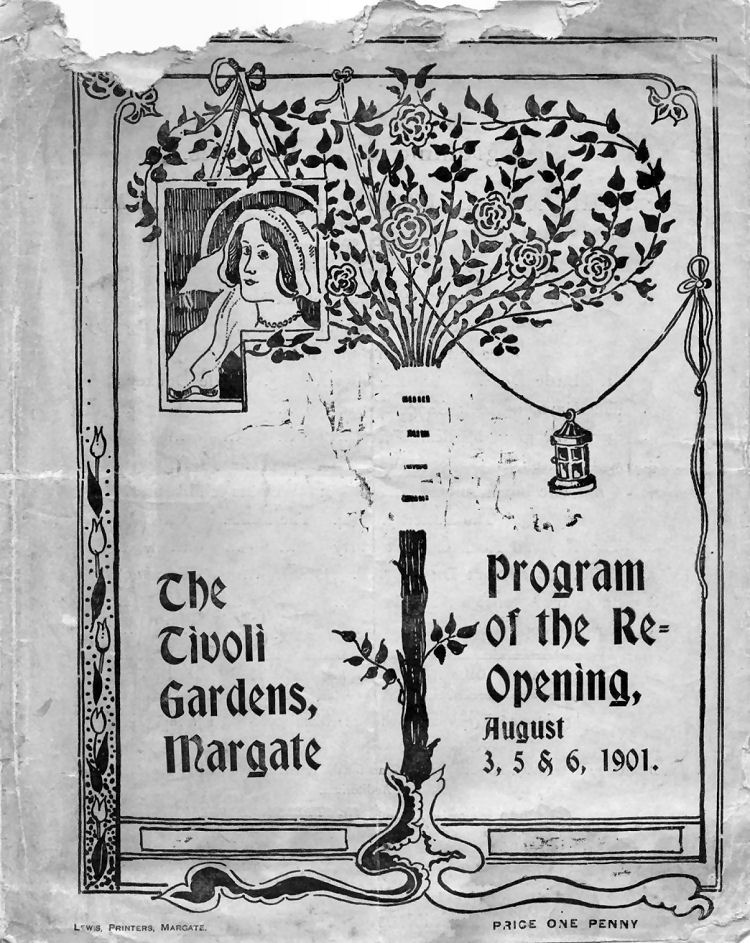|
Margate
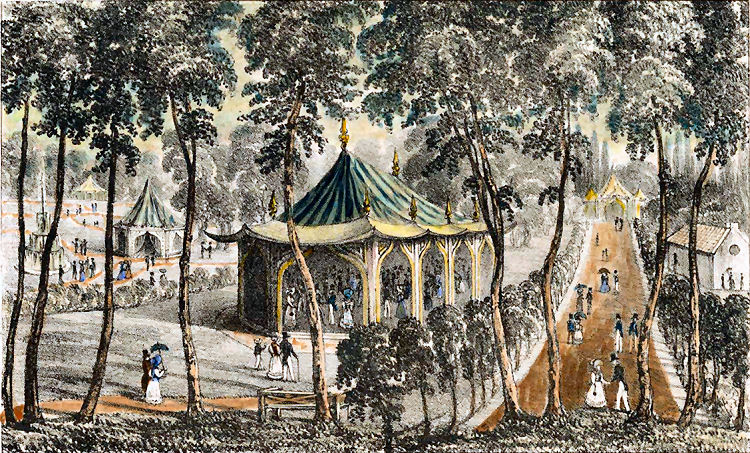
Above painting by C. Hllmandel, 1830s. |
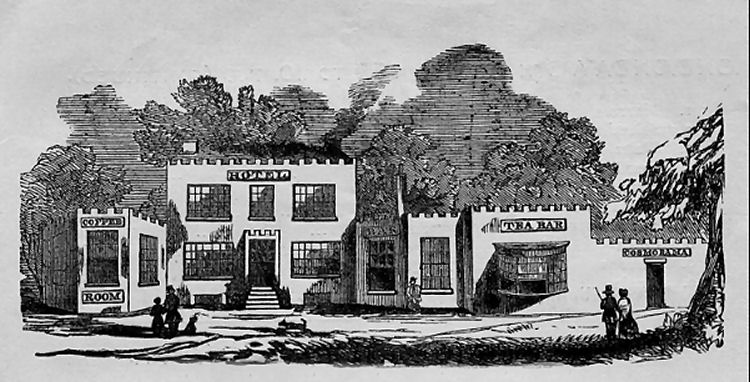
Above engraving showing what was titled the Tivoli Hotel Tea Bar
Cosmorama, 1848. |
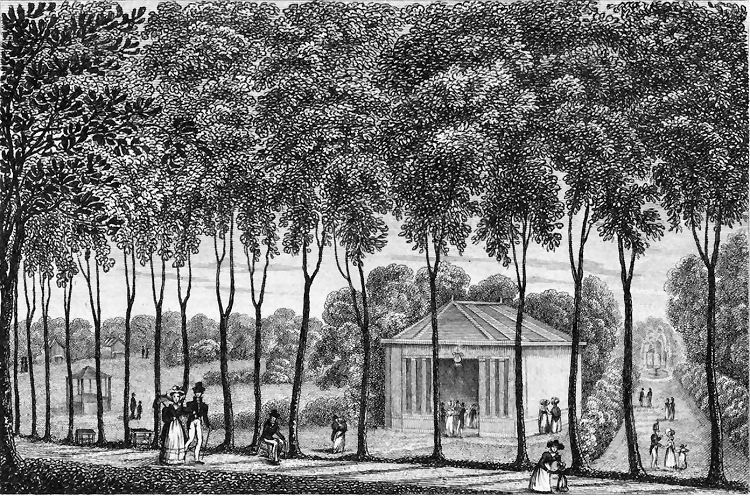
Above engraving by J Shury, 1873. |
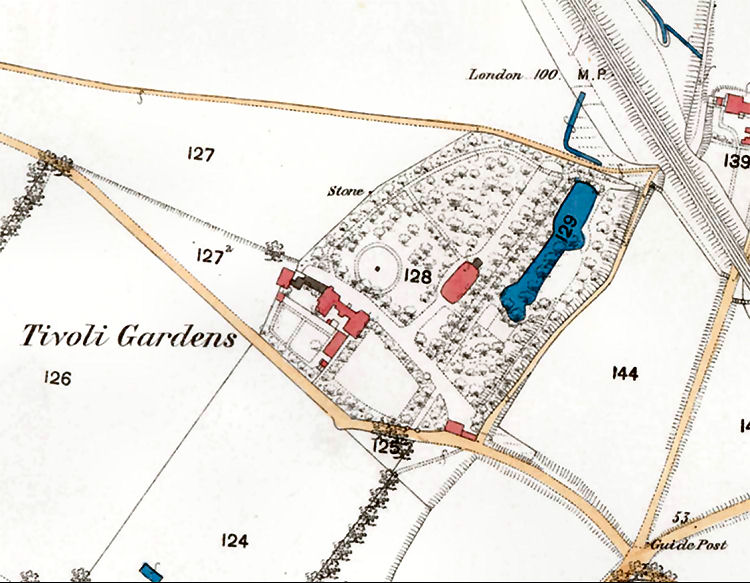
Above map dated 1872. |
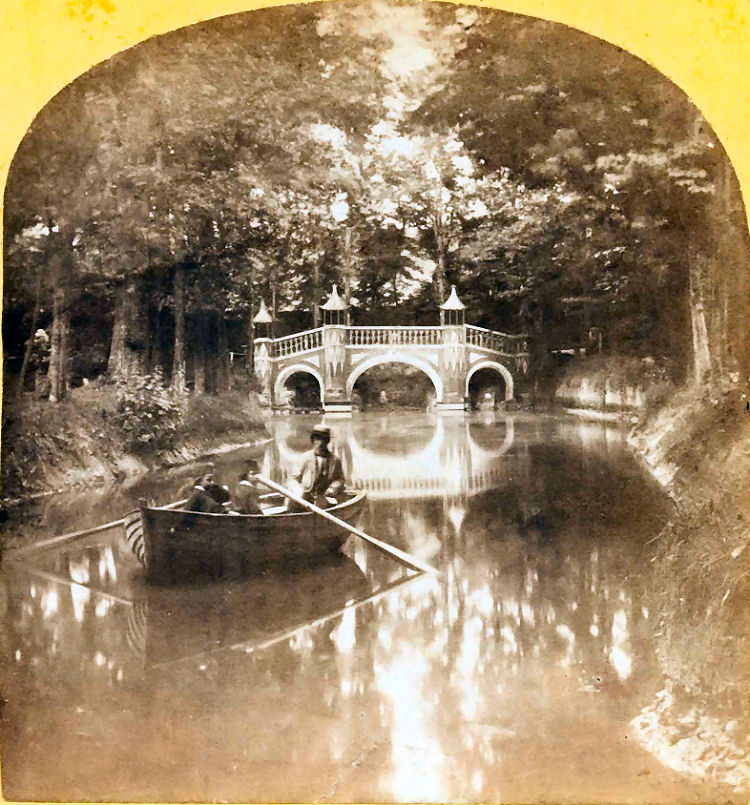
Above taken from a stereo slide, date unknown. |
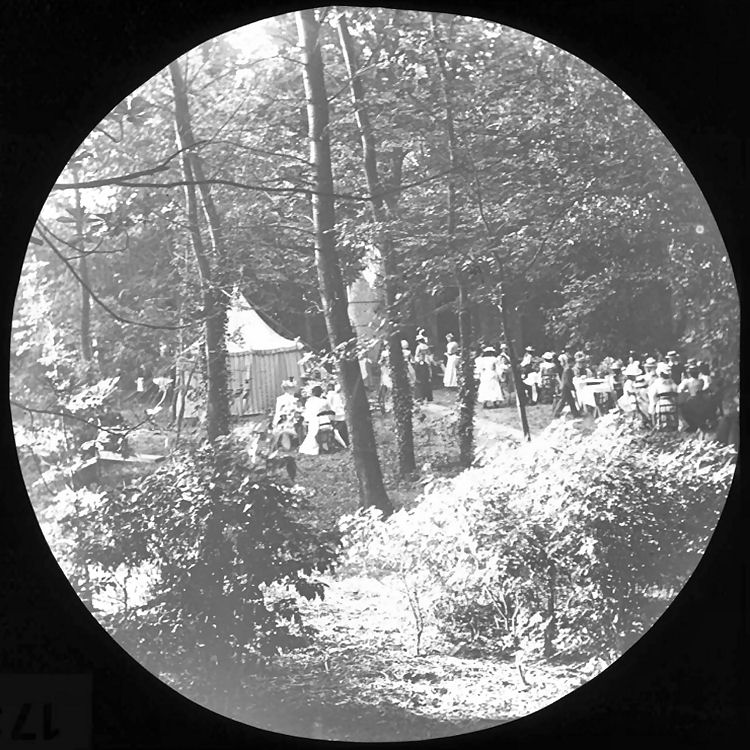
Above picture taken from a Magic Lantern slide 1898. |
|
From the Kentish Gazette, 28 April 1846.
MYSTERIOUS AND FATAL OCCURRENCE.
The greatest animation was caused in Margate on Wednesday last, the day
appointed for the Hon. Order of Odd Fellows of Thanet and friends to
accept an invitation given by a Brother, the host of the Tivoli Gardens,
to spend the evening with him at those delightful gardens. Hundreds
flocked there to enjoy the music and dancing, each countenance beaming
with cheerful smiles, and every one determined to be happy.
Early on the following morning a report was current that a person named
John Price, who is respectably connected residing at Rancorn, and
carrying on the business of a carrier, had been stopped on his way home,
about half-past ten, between the gardens and Hartsdown, and that in
making a resistance he had rendered his assailant insensible, and had
given him in custody on a charge of attempting to commit a robbery. The
man, who had been taken to the station-house, and was there lying in a
very dangerous state proved to be James Sutton, a native of Ramsgate,
aged 33 years, and respectably connected. The affair caused the greatest
sensation throughout the place. The resident magistrate, John Boys.
Esq., ordered Price into custody and subsequently investigated the
circumstances of the case, during which, notwithstanding every surgical
aid, the poor man died shortly after four o'clock without having uttered
a word. The result of this inquiry was (and nothing transpired to
contradict a statement made by Price, but rather to confirm it), that
the further hearing was adjourned until ten o’clock, in the hope that
additional light might be thrown on the lamentable affair, and heavy bail
was taken for Price's appearance. On the following day, however
(Friday), at five o'clock, a respectable jury was empanelled, by G. T.
Thompson, Esq., of Dover, the coroner, to inquire into the cause of, and
the circumstances attended upon, the death of the deceased. The moat
important evidence adduced before this officer was that of Inspector
Merchant, who deposed to a voluntary statement made by Price on
preferring the charge against the deceased, and which was as follows:—
"On Wednesday night, about half-past ten, I was going home from Tivoli,
and when half-way between that place and Hartsdown, Sutton (if it were
him) jumped out of the hedge by the footpath, and demanded of me,
catching me by the collar, if I had a watch; I said I had (although I
had not it with me at the time). he asked me if I had any money; I said
I had (and by fact had two sovereigns at the time). He then caught hold
of my neckerchief, and said he must have it or my life. We struggled
together, and I slipped up my hand and untied my neckerchief. He then
knocked me down twice, and kicked me in the loins. I at length got the
better of him, and got him down. He threatened to stab me if he had his
knife. I struck him several times violently on his head, calling out to
keep him down. Young Kemp I believe, was the first who came to my
assistance. We were straggling for three quarters of an hour. I was
sober and alone. I do not know the man."
Inspector Merchant further deposed, that he had examined the spot where
the fortunate occurrence took place, he observed a quantity of blood,
and the marks of a very violent struggle; and on the earth close to the
hedge two heel marks of boots, and the buds of the hedge trees were
rubbed off, as if some one had been rubbing against them; and in the
hole which was evidently made by beating the head against the ground,
there were two small stones, each sticking up about an inch.
Isaac Kemp was next examined, and gave evidence to the effect, that on
his way home from the gardens to Garlinge in company with Kitchingman,
he saw some one before him who called out "Hollo." He replied to the
person (who turned out to be Price) said, "Is that you Isaac?" Witness
replied "Yes." Upon which price advanced towards them, and said "Here's
a man who rushed out of the hedge and collared me;" and then made a
statement corresponding with the one related to Merchant. Witness
further said, that upon walking two or three rods further on they came
to the spot where Sutton was lying on the ground, who neither spoke nor
moved. They sent Kitchingman back to the gardens for assistance, Price
declaring he would stop by the man till daylight to see who he was.
Kitchingman returned with Police Constable Crump. Witness further stated
that Price was sober, and assisted in removing the deceased to the
garden, and subsequently to the station-house.
William Sutton, of Ramsgate, deposed that he had identified the deceased
as his brother James, and stated he had last seen him when both were in
company with Mr. Randall, a victualler, near upon eleven, in the
gardens: that his brother was in liquor, but not badly so; and that all
three had been together nearly the whole of the evening, and that
Randall had never been out of deceased’s presence from his first
entering the gardens until nearly eleven, when he went out to bid his
son good night, leaving deceased smoking his pipe in the coffee-room,
and that on his return in a short time deceased was gone.
This evidence was confirmed by Mr. Randall, and both witnesses stated
that Price was a stranger to them, and had not been in their company the
whole evening, and that, consequently, up to eleven o'clock no quarrel
could have taken place between them.
Mr. Hurst, of Ramsgate, a shipwright, gave the deceased, who had worked
for him many years, an excellent character.
Cramp, P.C., and others were examined but the facts deposed to by them
were similar to that already reported. A girl named Philpot, gave
testimony that, upon deceased being removed from the gardens to the
station-house, she heard Price say he had given the buffer a a Scotch
prize. Thus, beyond the statement of Price there was no evidence as to
the origin of this fatal occurrence. A post mortem examination of the
body was made and medical evidence adduced to show that the deceased
died from concussion of the brain, and which might be caused by beating
the head upon the ground, and was evidently the result of the injuries
he had received. The head of the deceased was dreadfully knocked
about—the eye blackened and lip cut; the forehead and back part of the
head much bruised; also marks on the throat, as if he had been seized by
the neckerchief and the knuckles forced violently against the throat.
After a lengthened enquiry, occupying about five hours, the jurors
retired for consultation, and on their return into court delivered a
verdict of "Manslaughter" against John Price, considering the violence
used more than necessary. Price, who was in court during the inquest,
was delivered into custody, and committed to take his trial at the
ensuing Maidstone assizes.
Additional Remarks on the Above Melancholy Affair.
The coat of Price, which was produced, was much torn. he apparently had
received but very little injury, bearing but two slight marks on his
face. He is a much smaller man than the deceased, who was the worse for
liquor, and was entirely out of his road either for Margate or Ramsgate;
but Price was in his direct way home. Price throughout had evinced not
the slightest disposition to conceal anything, but, on the contrary has
shown a desire to give every information, and continues to adhere
solemnly to the correctness of his statement; and the evidence rather
confirms it than otherwise. The witness Kemp stated that he himself did
not think, nor did he believe, that Price was aware when he first came
up that the man was so much injured. There the matter remains. Both were
members of the Odd Fellows. Many false reports have been circulated, as
may be naturally expected; but we do not notice them, our duty being
confined to strictly the facts of the case.
|
|
Illustrated London News, Saturday 2 May 1846.
ACCIDENTS AND OFFENCES.
MANSLAUGHTER OF A HIGHWAYMAN, NEAR RAMSGATE.
An affray of a fatal and extraordinary character has recently occupied
the attention of the magistrates and Coroner of Ramsgate. The facts
elicited by them went to show that on Wednesday (last week) a large
number of the inhabitants of the neighbouring villages congregated in
Margate to celebrate a festival of a benevolent society, in the Tivoli
Gardens. Amongst them was a man named James Sutton, reported to be
respectably connected, who, towards night, attracted attention by his
boisterous conduct. It appears that after the evening’s amusement he
left his brother’s company, and nothing was heard of him until midnight,
when two men named Kemp and Kitching, on their return home from the
gardens, while proceeding along a footpath leading to Hartsdown, an
adjacent parish, saw a man some distance in advance calling “Holloa!” On
coming up they found it to be John Price, a carrier, living at Runcorn.
Price said, in a very excited manner, “Here is a man who has been
attempting to rob me, and I will not leave him until I see who he is.” A
few yards distant they saw a man lying on the ground, who seemed
senseless, who was discovered to be Sutton. Price then charged Sutton
with attempting to rob him. His statement to the Inspector on duty was
as follows:—
“On Wednesday night, about half-past ten, I was going home from the
Tivoli, and when half-way between that place and Hartsdown, Sutton
jumped out of the hedge by the footpath, and demanded of me, catching me
by the collar, if I had a watch? I said I had. He asked me if I had any
money?
He then caught hold of me by the neckerchief, and said he must have it
or my life. We struggled together, and I slipped up my hand and untied
my neckerchief. He then knocked me down twice, and kicked me. I at
length got the better of him, and got him down. I struck him several
times violently on the head, calling out for assistance, and sitting
across him, to keep him down. Kemp was the first who came to my
assistance; we were struggling for three-quarters of an hour. I was
sober, and alone. I did not know the man.”
The man Sutton being apparently dying, medical aid was promptly called
to him, but he never rallied, and expired in the course of a few hours.
On the magistrates hearing of the death, they ordered Price to be
arrested, but subsequently liberated him on bail. On the Inspector
inspecting the spot where the affray occurred, he noticed a quantity of
blood on the ground, and marks of a very violent struggle; and in the
ground was a hole, evidently made by a man’s head beaten against it, and
in the centre were two small stones sticking up about an inch.
At the Coroner’s Inquest, Mr. Thornton, a surgeon, who had made a post
mortem examination of the body, deposed that death had been caused by
concussion of the brain, and which might have been produced by beating
the head upon the ground. The head was dreadfully knocked about; the eye
blackened, and lip cut; and marks on the throat, as if seized by the
neckerchief and a man’s knuckles forced into the flesh. It was proved
that the deceased and Price were perfect strangers. The deceased's
relatives spoke to his being a quiet, orderly man; and called the police
to show that they knew nothing of him, at least in the shape of a
highway robber. The Coroner’s Jury, after a lengthened consultation,
returned a verdict of “Manslaughter” against Price, considering the
violence more than necessary; and he was forthwith committed to
Maidstone gaol to take his trial at the ensuing assizes.
|
|
Southeastern Gazette, 3 May 1853.
Wednesday. (Before E. Oakes and C. Spencer, Esqrs.)
A certificate of transfer of the license of Mr. Capper for the
"Tivoli Hotel," was granted to Mr. Humphries.
|
|
Kentish Gazette 27 July 1858.
TIVOLI GARDENS.
These gardens, having been entirely remodelled, are now open daily, and
the spirited lessee, Mr. Humphryes, has spared neither pains nor expense
in rendering them worthy of public support. The principal walk in the
garden, affords a most pleasing view to the visitor on entering,
numerous figures being placed on each side, and so arranged as to light
the path in the evening. The beautiful Lake, that was once nothing but a
rude-looking stream, has been altered in shape, thoroughly cleaned out,
and a boat placed at the side for any who may be fond of aquatic sports.
The ball-room has been under thorough repair, and the accommodation for
dancing is somewhat extended. An excellent grotto has been erected by
Bailey, with Eve at the fountain; and not many yards distant a maze has
been planted for the juvenile visitors. At the extreme end of the garden
may be seen a correct model of Shakspeare's house; and just opposite the
bar a monster platform has been erected for open-air dancing.
Altogether, Tivoli Gardens are not what they were; they have been raised
to some importance, and claim the attention of the public. The
amusements are very numerous—so much so, that there is a continual
stream of entertainment from an early hour in the evening. The dancing
is under the direction of Mr. R. R. Gardner.
|
|
From the Kentish Chronicle, 26 September, 1863.
SINGULAR ACCIDENT AT MARGATE.
One day last week an accident happened to Mr. W. Humphreys, the late
proprietor of the “Tivoli,” who whilst walking on the Fort was shot in
the chin by a gentleman practising archery. The arrow went a
considerable way into Mr. Humphrey’s chin, but no serious injury
resulted.
|
The gardens themselves, although I don't know about the Hotel, were
renovated on several occasions, the latest I know of being in 1901 and were
reopened in August of that year. The programme of events is shown below.
LICENSEE LIST
WALTON Walter 1841+ (age 20 in 1841 ) )
DIVERS John 1847+
CAPPER Mr to May/1854
HUMPHRIES William May/1853-63 (age 52 in 1861 ) )
 Census Census
|






